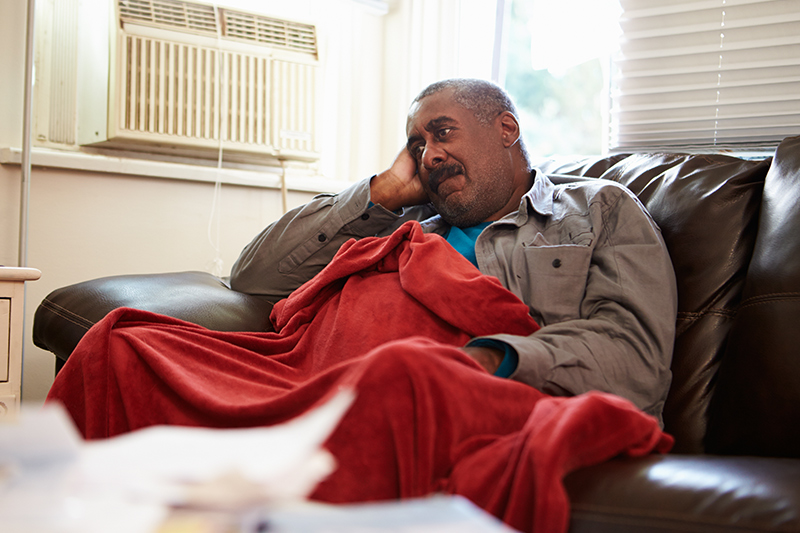
A restful night is important for our health and well-being,
yet, as we age, it can be elusive.
For most of us, a poor night’s sleep can mean irritability and fogginess the next day. But long-term sleep deprivation can have more serious effects, including memory problems and depression.
Insufficient sleep is an important issue for seniors, who sleep more lightly and for shorter time spans, whether as a normal part of aging or from medical problems common in older people. Chronic pain from conditions such as arthritis or back problems can keep us up at night, as does the need to use the bathroom if we suffer from bladder or prostate problems. As we age, we might take more prescription drugs that interfere with our sleep patterns. AARP’s 2016 sleep and brain health survey found that 43 percent of adults age 50-plus say they don’t get enough sleep.
How much is enough? Most research advocates 7 to 8 hours of sleep a night, refuting the notion that we need less sleep as we get older. However, too much is not healthy. A study from Brigham and Women’s Hospital of Boston found that sleeping too much, as well as not getting enough rest, can lead to worse cognitive function in old age.
A new report from AARP’s Global Council on Brain Health found that “chronic inadequate sleep puts people at higher risk for dementia, depression, heart disease, obesity, diabetes, fall-related injuries and cancer.” The council recommended that healthcare professionals take patients’ concerns about lack of sleep more seriously.
Causes of Insomnia
An inability to sleep well can be caused by primary insomnia from physical problems such as sleep apnea or restless leg syndrome. Special devices or surgery can treat serious sleep apnea, while drugs can often help restless leg syndrome.
More commonly, insomnia is secondary, related to an underlying issue such as drinking coffee too close to bedtime, stress or noise at night. Physical difficulties that impede sleep include heart failure, arthritis or gastroesophageal reflux (GERD). If you can fix the underlying issue, such as by wearing noise blockers at night, you can control the insomnia.
Effects of Insomnia
Scientists are discovering that sleep benefits us by recharging our bodies and minds. If we don’t get enough sleep, it can exacerbate various ailments:
Behavioral Therapy for InsomniaCognitive behavioral therapy (CBT) helps you recognize and change the worries that keep you tossing and turning all night. In clinical trials, it’s proved as effective or more so than prescription sleep medications. At the same time, CBT promotes good sleep habits. Check out the following strategies (from the Mayo Clinic).
|
Lack of concentration. Because we need sleep for our nervous systems to work properly, too little affects our concentration the next day. This can hurt our ability to solve problems and learn new information.
Memory problems. Some experts believe sleep gives neurons a chance to repair themselves. Without sleep, neurons may become so depleted that they begin to malfunction. Research has found that the deepest levels of sleep help consolidate our memories from the day.
Serious health problems. Long-term insomnia can lead to heart disease, heart failure, irregular heartbeat, high blood pressure, seizures, sensitivity to pain, a weakened immune system, stroke and diabetes.
Depression. One study showed that those with insomnia were five times as likely to develop depression as those who slept well through the night. One poll showed that people diagnosed with depression or anxiety were more likely to sleep fewer than six hours a night.
Harm to body. While we sleep, the body increases production of protein, which is needed to grow cells and repair cells damaged from factors such as stress and ultraviolet rays. Lack of sleep causes the body to release the stress hormone cortisol, which can break down skin collagen, the protein that keeps skin smooth and elastic. And if we don’t get enough deep sleep, we don’t release enough of the hormone that helps increase muscle mass, thicken skin and strengthen bones.
Weight gain. One study showed that people who slept less than six hours a day had an increased risk of becoming obese compared to those who slept 7 to 9 hours. Apparently, sleep loss stimulates the appetite, particularly for high-fat, high-carbohydrate foods.
Increased mortality. Various studies have shown that those who slept less had an increased risk of death, particularly from cardiovascular disease.
Relief for Insomnia
If your inability to sleep well isn’t from primary insomnia, there are many simple actions you can take to get some good shut-eye:
Adhere to a schedule. Go to bed at the same time and get up at the same time. Your body adjusts to this cycle, so when you change it, your cycle is disturbed.
Take a break. If you’re tossing and turning, get up and do something different, like reading or listening to music, until you feel sleepy. If something is on your mind, write it down, so you get it out of your thoughts.
Turn off electronics. Your cellphone, laptop and TV emit light that can disturb your sleep cycle. Instead, before you go to bed, read, meditate or listen to music.
Exercise. Twenty to 30 minutes of exercise a day can help you sleep, but working out too close to your bedtime can be stimulating. Experts recommend a 5- to 6-hour gap between sleep and exercise. Similarly, don’t eat too close to bedtime.
Avoid stimulants. Having coffee, nicotine or alcohol before you go to bed is guaranteed to prevent sleep. Although alcohol will make you initially drowsy, it interferes with deep and rapid eye movement (REM) sleep, which is needed for learning.
Nap early. If you’re tired, take a nap early in the afternoon and not for more than 30 minutes. Some studies have found that a long nap can cause problems with sleeping at night.
Seek out the sun. Get as much sunlight during the day as possible, while minimizing light at night. This helps your body stay on its inner clock.
Take medication. Your doctor can prescribe drugs that will help you sleep, if other less invasive methods don’t work. However, physicians don’t recommend taking sleeping pills on a long-term basis, and the pills’ side effects can be harmful for older people.
A non-prescription alternative is melatonin, a hormone that the brain naturally produces in response to darkness. Melatonin pills create the same sleepy response as the natural hormone, but medical experts warn that taking too much melatonin or taking it for too long can disrupt your sleep cycle. Doctors recommend 1 to 5 milligrams an hour before bed.
Other alternative medicines often used or recommended to help with insomnia are valerian root and chamomile. These are both available without prescription and can be given in pill/capsule form (or as a tea with chamomile). As with any prescription or non-prescription medicine, it’s best to consult your healthcare practitioner and/or pharmacist to make sure there are no known interactions with your current medication regimen.
Another promising sleep aid is cognitive behavioral therapy. See sidebar, “Behavioral Therapy for Insomnia.”
Sources
“You Need 7-8 Hours of Sleep for Better Brain Health,” Jan. 10, 2017, AARP.
“What’s the Sweet Spot for Sleep and Optimal Brain Function?,” AARP.
“Getting Older, Sleeping Less,” Jan. 16, 2017, New York Times.
“10 Things to Hate About Sleep Loss,” WebMD.
“Insomnia,” Feb. 6, 2017, Healthline.
“Brain Basics: Understanding Sleep,” National Institute of Neurological Disorders and Stroke.
“Insomnia and aging,” Mayo Clinic.
Blog posting provided by Society of Certified Senior Advisors
www.csa.us




